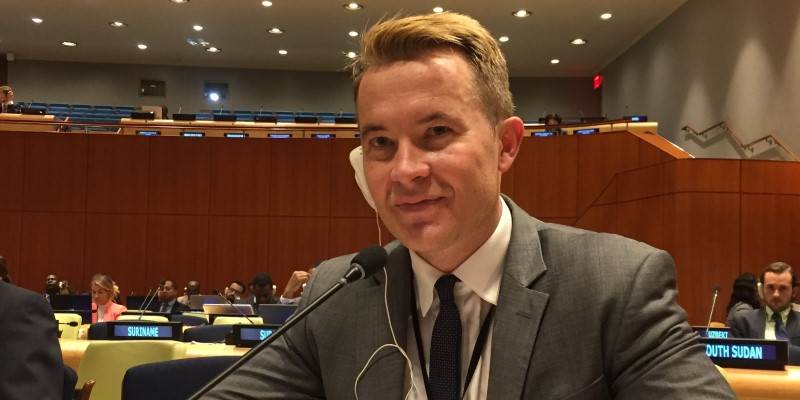Chair,
I have the honour to speak on behalf of the five Nordic countries: Denmark, Finland, Iceland, Sweden, and my own country, Norway.
The issue of criminal accountability of UN officials and experts on mission has been on the agenda of the Sixth Committee since 2006. The issue is still critically important. It is now paramount that both the UN and its Member States, by policy, legislation and action, exercise a zero-tolerance policy for crimes committed by UN staff and experts on mission.
The UN has taken important and timely steps in recent years to outroot sexual exploitation and abuse from the UN structures and operations. The appointment of the Special Coordinator on improving the United Nations’ response to sexual exploitation and abuse and the Secretary-General’s 2017-strategy to improve the UN’s system-wide approach to preventing and responding to sexual exploitation and abuse, pave the way for a strengthened, comprehensive and targeted approach to this serious matter that could actually bring about change.
In particular, we welcome the adoption of the Compact on Commitment to Eliminate Sexual Exploitation and Abuse as a promising step to strengthen the co-operation between the UN and its Member States on victim support, prevention and accountability measures.
We commend the UN for this development, but there is still a long way ahead before the UN has fully implemented a zero-tolerance policy for sexual exploitation and abuse.
We agree that the principal attention is rightly placed on sexual exploitation and abuse. However, our topic is broader and seeks to address any kind of criminality by the UN officials and experts on mission. Effective measures for ensuring accountability for those responsible for criminal conduct is imperative. However, we must be clear about where the primary responsibility for addressing this issue lies: with the national jurisdictions of Member States. States must ensure or establish jurisdiction for crimes committed by their nationals serving as UN officials or experts on mission.
In this respect, we encourage all Member States to submit relevant information to the Secretary-General regarding the status of their domestic laws on this matter, in accordance with paragraphs 25 and 26 of resolution 71/134.
Chair,
In addition to reporting, further measures must also be considered to provide an incentive for Member States to make the necessary legislative amendments.
The Nordic countries would again like to suggest the development of a general policy on minimal requirements for states whose nationals serve as UN officials and experts on mission. The policy could be developed drawing inspiration from the aforementioned Compact. An essential requirement should be that all countries have relevant jurisdiction in place in order to be able to investigate and prosecute potential crimes committed by their nationals when serving abroad.
The Nordic countries also remain ready to consider a proposal for a comprehensive international legal framework to ensure that criminal conduct is addressed. We welcome the Committee’s further elaboration on this issue under the seventy-third session of the General Assembly next year.
Chair,
We thank the Secretary-General for the informative report that has been submitted under this agenda item (A/72/205). This year, the Secretary-General’s report contains in Annex 1 an overview of cases referred to Member States since 1 July 2007, including information received from Member States on their follow-up of cases. Annex 2 refers to cases that were initiated by Member States and then notified to the UN. The two Annexes provide useful information on the Member States’ reporting and follow up on criminal cases.
Annex 1 paints a discouraging picture. Of the 124 cases referred to Member States, States have only provided information to the Secretary-General on their follow-up in their national jurisdictions in 24 instances. This illustrates a general tendency over the past decade not to handle these cases adequately. This is unacceptable.
On the positive side, in Annex 2 we note that the Secretary General has received information on the status of investigation, prosecutorial or disciplinary action in 27 cases.
In previous resolutions, the wording has precluded the inclusion in the report of information concerning which Members States have – and even more importantly, which Member States have not – provided any feedback to the Secretary-General on the follow-up of cases.
We therefore call for this year’s resolution to include language so that this information can be listed. Ensuring accountability for those who commit crimes while serving as UN officials and experts on mission is important. The very credibility of the UN is at stake. We cannot accept anything less than full transparency regarding Member States’ willingness and ability to hold their own nationals accountable for crimes committed while in service for the UN.
Chair,
Finally, the Nordic countries underline that all Member States must uphold the principles of due process and rule of law while investigating and prosecuting cases within this segment. It is equally important to ensure the effective protection of victims, witnesses and whistle-blowers.
Thank you.

6C: Criminal accountability of UN officials and experts on mission
Joint statement on behalf of Denmark, Finland, Iceland, Norway and Sweden, delivered by Counsellor Andreas Motzfeldt Kravik to the Sixth Committee on Criminal accountability of United Nations officials and experts on mission, 10 October 2017.
| Sixth Committee